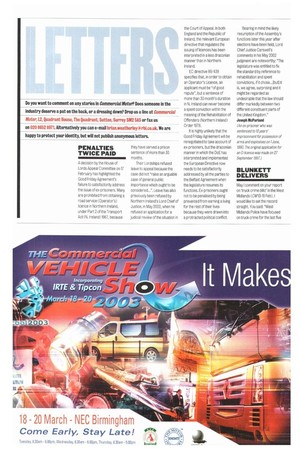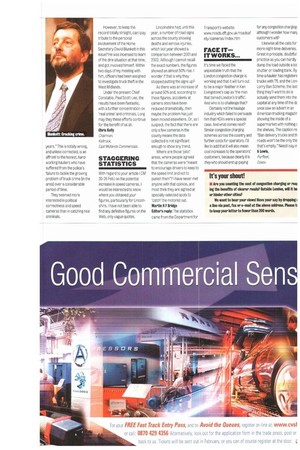Do you want to comment on any stories In Commercial
Page 24

Page 25

If you've noticed an error in this article please click here to report it so we can fix it.
Motor? Does someone in the industry deserve a pat on the back, or a dressing dormP Drop us a line at Commercial Motor, L2, Quadrant House, The Quadrant, Sutton, Surrey SM2 5A5 or fax us on 020 8652 8971. Alternatively you can e-mail brian.weatherley®rbl.co.uk. We are happy to protect your identity, but will not publish anonymous letters, PENALTIES TWICE PAID
A decision by the House of Lords Appeal Committee on 17 February has highlighted the Good Friday Agreement's failure to satisfactorily address the issue of ex-prisoners. Many are prohibited from obtaining a road service (Operator's) licence in Northern Ireland, under Part 2 of the Transport Act (N. Ireland)1967, because they have served a prison sentence of more than HI months.
Their Lordships refused leave to appeal because the case did not "raise an arguable case of general public importance which ought to be considered...". Leave has also previously been refused by Northern Ireland's Lord Chief of Justice, in May 2002, when he refused an application for a judicial review of the situation in the Court of Appeal. In both England and the Republic of Ireland, the relevant European directive that regulates the issuing of licences has been interpreted in a less draconian manner than in Northern Ireland.
EC directive 89/438 specifies that, in order to obtain an Operator's Licence, an applicant must be "of good repute", but a sentence of more than 30 month's duration in N. Ireland can never become a spent conviction within the meaning of the Rehabilitation of Offenders (Northern Ireland) Order 1978.
It is highly unlikely that the Good Friday Agreement wk be renegotiated to take account of ex-prisoners, but the draconian manner in which the DoE has interpreted and implemented the European Directive now needs to be satisfactorily addressed by all the parties to the Belfast Agreement when the legislature resumes its functions. Ex-prisoners ought not to be penalised by being prevented from earning a living for the rest of their lives because they were drawn into a protracted political conflict. Bearing in mind the likely resumption of the Assembly's functions later this year after elections have been held, Lord Chief Justice Carswell's comments in his May 2902 judgment are noteworthy: "The legislature was entitled to fix the standard by reference to rehabilitation and spent convictions, if it chose...ent) it is, we agree, surprising and it might be regarded as undesirable that the law should differ markedly between two different constituent parts of the United Kingdom."
Joseph Weiland (An ex-prisoner who was sentenced to10 years' imprisonment for possession of arms and explosives or I June, 1990. The original application for an 0-licence was made on 27 September 1997.)
BLUNKETT DELIVERS
May I comment on your report on 'truck crime blitz' in the West Midlands (CM13-19 Feb). I would like to set the record straight. You said: "West Midlands Police have focused on truck crime for the last five years." This is totally wrong, and unless corrected, is an affront to the honest, hardworking hauliers who have suffered from the police's failure to tackle the growing problem of truck crime lin the areal over a considerable period of time.
They seemed more interested in political correctness and speed cameras than in catching real criminals. However, to keep the record totally straight, can I pay tribute to the personal involvement of the Home Secretary David Blunkett in this issue? He was incensed to learn of the dire situation at that time, and got involved himself. Within two days of my meeting with him, officers had been assigned to investigate truck theft in the West Midlands.
Under the present Chief Constable, Paul Scott-Lee, the results have been fantastic, With a further concentration on 'real crime' and criminals. Long may they these efforts continue for the benefit of us all.
Chris Kelly Chairman, Keitmuck, East Midlands Commercials.
STAGGERING STATISTICS
With regard to your article (CM 20-26 Feb) on the potential increase in speed cameras, I would be interested to know where you obtained your figures, particularly for Lincolnshire. I have not been able to find any definitive figures on the Web, only vague quotes.
Lincolnshire had, unti this year, a number of road signs across the county showing deaths and serious Injuries, which last year showed a comparison between 2001 and 2002. Although I cannot recall the exact numbers, the figures showed an almost 50% rise. I wonder if that is why they stopped putting the signs up?
As there was an increase of around 50% and, according to these figures, accidents at camera sites have been reduced dramatically, then maybe the problem has just been moved elsewhere. Or, as I suspect, the fact that there are only a few cameras in the county means the data collected is not significant enough to show any trend.
Where are those 'pilot' areas, where people agreed that the cameras were "meant to encourage drivers to keep to the speed limit and not to punish them"? I have never met anyone with that opinion, and most think they are sighted at specially-selected spots to 'catch' the motorist out. Martki II Midge
Editor's reply: The statistics came from the Department for
Transport's website: www.roads.dffigov.uk/roadsaf ety/cameras/index.htm
FACE IT— IT WORKS...
It's time we faced the unpalatable truth that the London congestion charge is working and that it will turn out to be a major feather in Ken Livingstone's cap as 'the man that tamed London's traffic'. And who is to challenge that?
Certainly not the haulage industry which failed to persuade him that HGVs were a special case. And what comes next? Similar congestion charging schemes across the country and further costs for operators. I'd like to add that it will also mean cost increases to the operators' customers, because clearly it is theywho should end up paying for any congestion charging although I wonder how many customers will?
Likewise all the calls for more night-time deliveries. Great in principle, doubtful practice as you can hardly dump the load outside a loc shutter or loading bank. By time a haulier has registers trucks with TfL and the Loni Lorry Ban Scheme, the last thing they'li want to do is actually send them into the capital at any time of the ds once saw an advert in an American trucking magazir showing the inside of a supermarket with nothing c the shelves, The caption re "Ban delivery trucks and th roads won't be the only thir that's empty." Need I say rr Lewis, Purfleet, Essex.




































































































































































